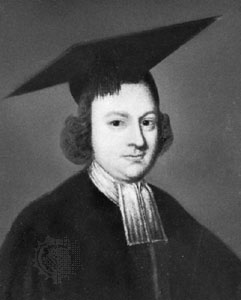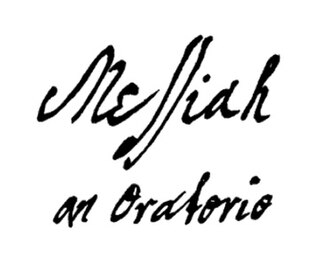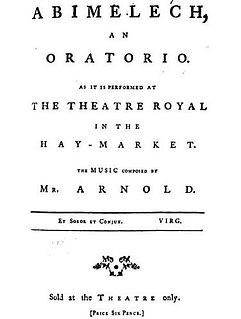
Hannah is one of the wives of Elkanah mentioned in the First Book of Samuel. According to the Hebrew Bible she was the mother of Samuel.

Christopher Vane, 1st Baron Barnard was an English peer. He is known for his disputes with his heirs and for employing Peter Smart, father of the poet Christopher Smart, as a steward.

Theodora is a dramatic oratorio in three acts by George Frideric Handel, set to an English libretto by Thomas Morell. The oratorio concerns the Christian martyr Theodora and her Christian-converted Roman lover, Didymus. It had its first performance at Covent Garden Theatre on 16 March 1750.

Saul is a dramatic oratorio in three acts written by George Frideric Handel with a libretto by Charles Jennens. Taken from the First Book of Samuel, the story of Saul focuses on the first king of Israel's relationship with his eventual successor, David; one which turns from admiration to envy and hatred, ultimately leading to the downfall of the eponymous monarch. The work, which Handel composed in 1738, includes the famous "Dead March", a funeral anthem for Saul and his son Jonathan, and some of the composer's most dramatic choral pieces. Saul was first performed at the King's Theatre in London on 16 January 1739. The work was a success at its London premiere and was revived by Handel in subsequent seasons. Notable modern-day performances of Saul include that at Glyndebourne in 2015.

Athalia is an English-language oratorio composed by George Frideric Handel to a libretto by Samuel Humphreys based on the play Athalie by Jean Racine. The work was commissioned in 1733 for the Publick Act in Oxford – a commencement ceremony of the local colleges, one of which had offered Handel an honorary doctorate. The story is based on that of the Biblical queen Athaliah. Athalia, Handel's third oratorio in English, was completed on 7 June 1733, and first performed on 10 July 1733 at the Sheldonian Theatre in Oxford. The Bee reported that the performance was "performed with the utmost Applause, and is esteemed equal to the most celebrated of that Gentleman's Performances: there were 3700 Persons present".

Esther is an oratorio by George Frideric Handel. It is generally acknowledged to be the first English oratorio. Handel set a libretto after the Old Testament drama by Jean Racine. The work was originally composed in 1718, but was heavily revised into a full oratorio in 1732.

Deborah is an oratorio by George Frideric Handel. It was one of Handel's early oratorios in English and was based on a libretto by Samuel Humphreys. It received its premiere performance at the King's Theatre in London on 17 March 1733.

Joseph is an oratorio by George Frideric Handel completed in the summer of 1743. Joseph is composed to an English language libretto by the Rev.James Miller, based on Apostolo Zeno's Italian language libretto for Giuseppe, an oratorio by Antonio Caldara. It received its premiere performance that following Lenten season on 2 March 1744 at the Covent Garden Theatre.

Jubilate Agno is a religious poem by Christopher Smart, and was written between 1759 and 1763, during Smart's confinement for insanity in St. Luke's Hospital, Bethnal Green, London. The poem was first published in 1939, under the title Rejoice in the Lamb: A Song from Bedlam, edited by W. F. Stead from Smart's manuscript, which Stead had discovered in a private library.

Hymns and Spiritual Songs for the Fasts and Festivals of the Church of England, by Christopher Smart, was published in 1765, along with a translation of the Psalms of David and a new version of A Song to David. He wrote these poems while he was in a mental asylum and during the time he wrote Jubilate Agno.

Hymns for the Amusement of Children (1771) was the final work completed by English poet Christopher Smart. It was completed while Smart was imprisoned for outstanding debt at the King's Bench Prison, and the work is his final exploration of religion. Although Smart spent a large portion of his life in and out of debt, he was unable to survive his time in the prison and died soon after completing the Hymns.
A Song to David, a poem by Christopher Smart, was most likely written during his stay in a mental asylum while he wrote Jubilate Agno. Although it received mixed reviews, it was his most famous work until the discovery of Jubilate Agno.

The Hop-Garden by Christopher Smart was first published in Poems on Several Occasions, 1752. The poem is rooted the Virgilian georgic and Augustan literature; it is one of the first long poems published by Smart. The poem is literally about a hop garden, and, in the Virgilian tradition, attempts to instruct the audience in how to farm hops properly.

The Hilliad was Christopher Smart's mock epic poem written as a literary attack upon John Hill on 1 February 1753. The title is a play on Alexander Pope's The Dunciad with a substitution of Hill's name, which represents Smart's debt to Pope for the form and style of The Hilliad as well as a punning reference to the Iliad. In "Book the First" of The Hilliad, Hillario is seduced by a Sibyl to give up his career as an apothecary and instead becomes a writer. However, his fortune quickly descends with Hillario ultimately turning into the "arch-dunce".

The English poet Christopher Smart (1722–1771) was confined to mental asylums from May 1757 until January 1763. Smart was admitted into St Luke's Hospital for Lunatics, Upper Moorfields, London, on 6 May 1757. He was taken there by his father-in-law, John Newbery, although he may have been confined in a private madhouse before then. While in St Luke's he wrote Jubilate Agno and A Song to David, the poems considered to be his greatest works. Although many of his contemporaries agreed that Smart was "mad", accounts of his condition and its ramifications varied, and some felt that he had been committed unfairly.
Hannah or Hanna may refer to:

Messiah, the English-language oratorio composed by George Frideric Handel in 1741, is structured in three parts, listed here in tables for their musical setting and biblical sources.

Der Messias, K. 572, is Wolfgang Amadeus Mozart's 1789 German-language version of Messiah, George Frideric Handel's 1741 oratorio. On the initiative of Gottfried van Swieten, Mozart adapted Handel's work for performances in Vienna.














